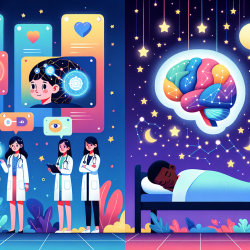Introduction
Attention-Deficit/Hyperactivity Disorder (ADHD) is a prevalent neurodevelopmental condition that affects individuals across the lifespan. Recent research, such as the Swedish nationwide register-based study, has shed light on the significant association between ADHD and sleep disorders. This blog aims to equip practitioners with insights from the study to enhance their clinical practice, ultimately improving outcomes for children and adults with ADHD.
Understanding the Link Between ADHD and Sleep Disorders
The study revealed that individuals with ADHD have a markedly increased risk of sleep disorder diagnoses and sleep medication prescriptions compared to those without ADHD. Specifically, 7.5% of individuals with ADHD had a sleep disorder diagnosis, and 47.5% were prescribed sleep medications. These findings underscore the importance of addressing sleep issues as part of comprehensive ADHD management.
Key Findings and Implications
- Prevalence Across Age Groups: The prevalence of sleep disorders was highest among older adults with ADHD, yet the relative risk was most pronounced in children and adolescents. This suggests a critical need for early intervention.
- Gender Differences: Females with ADHD showed higher rates of sleep disorders and medication prescriptions than males, highlighting the need for gender-sensitive approaches in treatment.
- Medication Considerations: While ADHD medications can impact sleep, the study found that the association between ADHD and sleep disorders persists even in those not on medication. This points to the intrinsic link between ADHD and sleep issues, beyond medication effects.
Implementing Research Insights in Practice
Practitioners can leverage these findings to refine their approach to ADHD management:
- Systematic Sleep Assessments: Incorporate regular sleep evaluations into ADHD treatment plans, using both subjective reports and objective measures where possible.
- Holistic Treatment Plans: Develop comprehensive treatment strategies that address both ADHD symptoms and sleep disorders, potentially including behavioral interventions and lifestyle modifications.
- Gender-Specific Strategies: Tailor interventions to account for gender differences in sleep disorder prevalence and treatment response.
Encouraging Further Research
While the study provides valuable insights, there is a need for continued research to explore the underlying mechanisms linking ADHD and sleep disorders. Practitioners are encouraged to contribute to this body of knowledge through clinical observations and participation in research initiatives.
Conclusion
By integrating the findings from the Swedish study into clinical practice, practitioners can enhance the quality of care for individuals with ADHD. Addressing sleep disorders as part of ADHD management not only improves sleep quality but also has the potential to positively impact overall mental health and daily functioning.
To read the original research paper, please follow this link: Prevalence of sleep disorder diagnoses and sleep medication prescriptions in individuals with ADHD across the lifespan: a Swedish nationwide register-based study.










